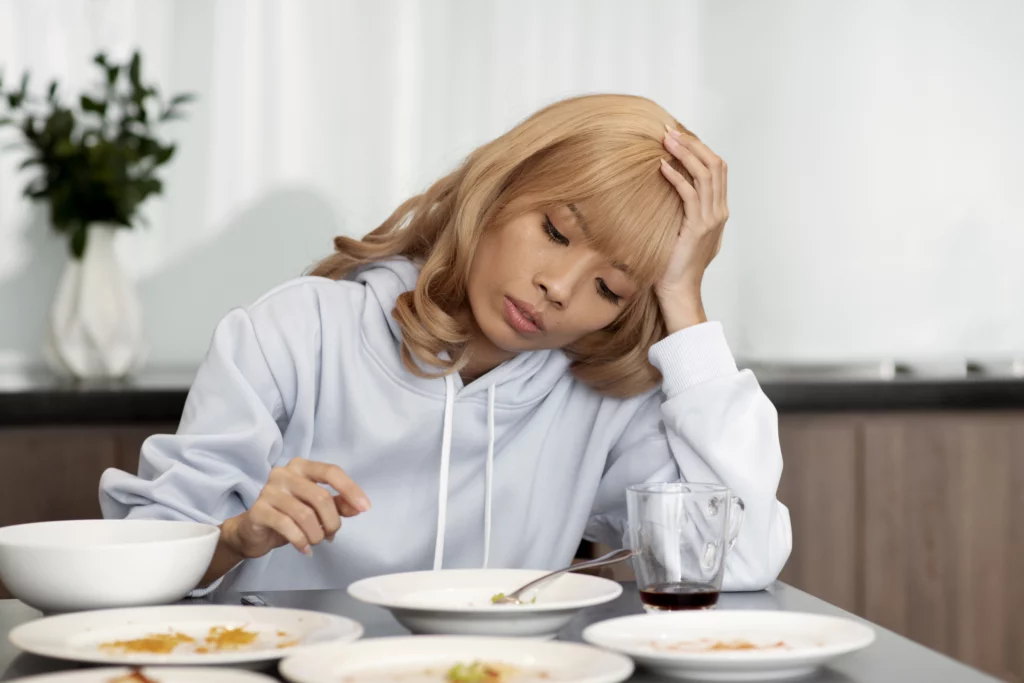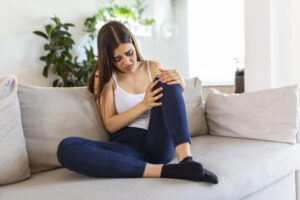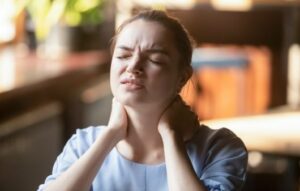Overview
Are you feeling nauseous, followed by a vomiting episode after you are done having your meal? Something is not up to the mark and might get you to think about why it happened! Is it because of the food you ate or do you have any underlying gastric problem?
Nausea after meals can stem from several reasons ranging from an allergy or triggering foods to your system or gastritis and bulimia nervosa. Over-the-counter medications can treat nausea and vomiting, while for consistent pain and nausea, getting connected with the healthcare provider for effective diagnosis is mandatory!
Why do I feel nauseous after I eat?
If you feel nauseated right after your meals, the reason could be related directly to what you ate or problems in digestion due to any underlying medical condition. Some prominent causes can be gastritis, food poisoning, ulcers, and bulimia nervosa. Some of the causes also depend more on the time after which you feel nauseated when consuming any food.
If the uncomforting feeling of nausea starts right after you have eaten something, the first thing to consider and that comes to your mind is :
“Is the food I have eaten good or of poor quality? Was it unhealthy, junk, or rotten? Or am I allergic to this food? Was there something in the food that my GIT is allergic to ?”
These valid concerns come to mind only in case of instant nausea. If nausea occurs after eating food within 7-8 hours, it can be the cause of food poisoning that takes some time to show up in the body.
If we enlist all the causes of nausea right after you finish your meal, they would be
- Pregnancy
- Junk /rotten food (food that has expired and can no longer be eaten)
- Allergy
- Intolerance, e.g., lactose or citrus fruit tolerance
- Gastroenteritis (burning acne in the stomach causing indigestion)
- Viral or bacterial infection
- Stress or anxiety
- Acid reflux.
How to prevent nausea after eating?
One of the most common causes of nausea after eating is Pregnancy. It can be prevented in some of the most accessible yet tricky ways that we often miss and forget when we consume food. It’s obvious not to think of having nausea during pregnancy, as in some pregnancies, nausea happens even if you take all the measures to prevent it, and it can certainly not be treated or prevented until the pregnancy is over. However, chewable and sweet tablets are often recommended by healthcare providers to deal with nausea in pregnancy.
Some of the other ways to prevent nausea after eating are:
- Eating in small chunks.
- Eating slowly
- Ginger tea
- Avoid mixing hot and cold foods to avoid disturbing GIT disturbances.
- Avoid brushing your teeth right after eating to avoid irritating the taste buds.
- The position while eating also matters. Sitting upright is the best way to eat and digest food effectively.
- Crushing an ice cube in your mouth when you feel nauseated is also one of the best ways to deal with or prevent nausea right after you eat.
What to do when you feel like vomiting or nausea after eating?
Not every nausea ends in vomiting. Sometimes, or let’s say most of the time, nausea starts with a dizzy feeling followed by a bitter or metallic taste in the mouth. Sometimes, it crosses the threshold, the emesis (vomiting) status. Before this cycle starts, there are some ways to treat nausea right after eating.
- Sit in the most comfortable position for you! Don’t lie down or do any physically strenuous exercise that might trigger nausea, which ultimately leads to vomiting.
- Staying hydrated is key! Usually, not after the meal but before you start eating and throughout the day, keep yourself hydrated. It will help you regulate the normal homeostasis of the body, preventing any nausea and vomiting.
- Smells, especially powerful ones, can impact a person’s mood and overall health. Some people are also allergic to strong scents or smells in a closed, confined space, which can lead to nausea and vomiting. Avoiding these smells or using masks to cover your nose when in similar surroundings can help you get through the nausea and vomiting.
- Eating lightly, slowly, and in small bites can help you avoid triggering nausea and vomiting. Take one bite at a time, and avoid taking another until one is finished.
- Over-the-counter medications like Dimenhydrinate (Dramamine), Meclizine (Bonine), and Bismuth subsalicylate (pepto-bismol) are readily available and can treat vomiting and nausea.
- Avoiding alcohol and caffeine can also be a significant contributor to aggravating the symptoms of nausea and vomiting.
When to consult a doctor?
Nausea and vomiting that persist for a longer period of time are concerning and require a proper diagnosis for an underlying cause. Usually, these issues are resolved by OTC medication and preventive measures for a temporary period. If they persist for a longer period of time, it usually indicates an underlying issue that needs to be addressed.
FAQs about nausea after eating
Yes. Periods cause changes in hormone levels in the body. These fluctuations lead to nausea, which usually occurs 2-3 days after starting your menstrual cycle, after which it subsides.
Nausea is one of the significant symptoms in the case of early pregnancy, followed by missed periods and morning sickness. It can also indicate that you are sick and will stay longer. It’s good to get the needful consultation in case of persistent nausea.







